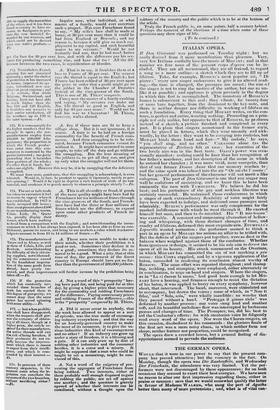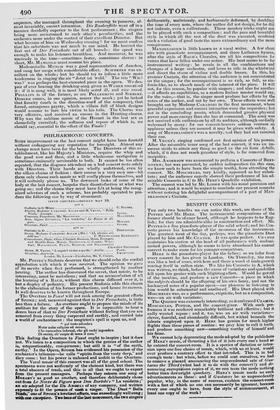THE GERMAN OPERA.
WOULD that it were in our power to say that the present com- pany has proved attractive; but the contrary is the fact. On Monday, though the opera was Die ZaubetiliSte, and Wednesday Der Freischutz, the attendance was very limited. Yet the per- formers were not discouraged by these appearances; for on both occasions they seemed to exert their best energies. We have seen no reason to alter our first impression regarding them, either in praise or censure: save that we would somewhat quality the latter in favour of Madame. WALKER, who sung the part of Agatha. better than many of more pretensions and what is of vital con- sequence, she managed throughout the evening to preserve, al- most invariably, correct intonation. The Zauberflete went of in a manner decidedly superior to the first performance ; the singers being more accustomed to each other's peculiarities, and the orchestra more under the control of their excellent Director. But what became of him on Wednesday evening? fur we must confess that his substitute was not much to our mind. He hurried the first act of Der Freischutz out of all bounds ; the speed was enough to make his listeners breathless. And moreover, he was unsteady in the time—sometimes faster, sometimes slower : in short, MT. MANGOLD must resume his place. Mademoiselle MUNCH was a good representative of Anne/ten, and sung her songs with considerable effect. Se HMEZER was ex- cellent on the whole; but he should try to infuse a little more tenderness in singing the air "Jetzt ist wohl." The trio " Wie? was?" was perhaps the best-executed piece in the opera. We des- pair of ever hearing the drinking-song given as WEBER conceived it : if it is sung well, it is most likely acted ill, and vice versd. PisiLties is of the former, so are PELLEGRINI and SIEBERT. DOBLER comes, in our opinion, nearer the mark ; yet he lacked that ferocity (such is the direction-word of the composer), that forced, outrageous gayety, which a villain full of black designs would assume to lure his victim to his toils. The Chorus was very effective, and received an encore in the Hunting-chorus. Why was the sublime music of the Hermit in the last act so shamefully curtailed; the softness and repose of which is, we should say, essential to the effect of the Finale?





















 Previous page
Previous page